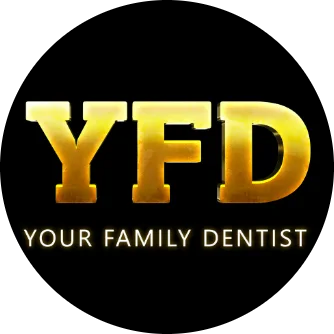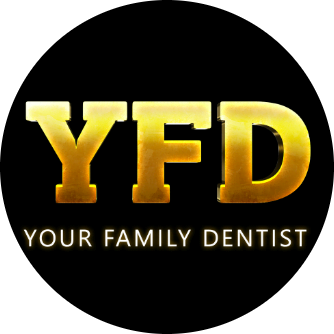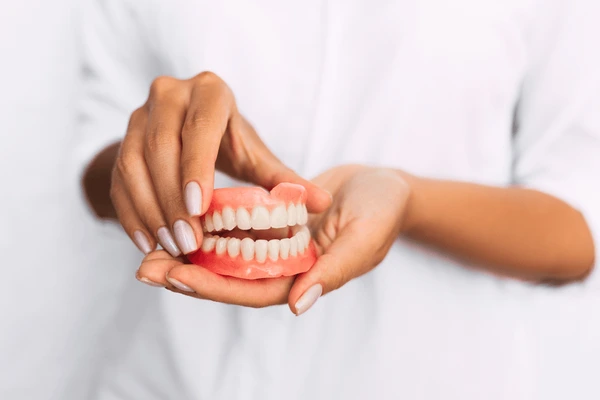- (02) 9601 7534
- support@yourfamilydentist.com.au
- Liverpool & Blacktown
- Liverpool & Blacktown
Welcome to Your Family Dentist
At Your Friendly Family Dentist We prioritize hard work, honesty, and achieving perfection in every smile we create.
Making dental care accessible: We understand that cost can be a concern. That’s why we offer numerous flexible payment plans, including options for payment through superannuation.
Your comfort is our priority: We offer on-site IV sedation and conscious sedation for patients who may experience anxiety during dental procedures.

What Are Denture
A denture is a removable dental appliance replacement for missing teeth and surrounding tissue. They are made to closely resemble your natural teeth and may even enhance your smile.
There are two types of dentures completes denture and partial dentures. Complete dentures are used when all of the teeth are missing, while partial dentures are used when some natural teeth remain. A Tooth Partial denture not only fills in the spaces created by missing teeth, it prevents other teeth from shifting.
A complete denture may be either “conventional” or “immediate.” A conventional type is made after the teeth have been removed and the gum tissue has healed, usually taking 4 to 6 weeks. During this time the patient will go without teeth. Immediate dentures are made in advance and immediately placed after the teeth are removed, thus preventing the patient from having to be without teeth during the healing process.
Once the tissues shrink and heal, adjustments will have to be made. Denture implants are very durable appliances and will last many years, but may have to be remade, repaired, or readjusted due to normal wear.
Advantage
- Restored Smile and Confidence: Dentures allow you to smile confidently without feeling self-conscious about missing teeth. This can significantly improve your self-esteem and quality of life.
- Improved Chewing Ability: Missing teeth can make chewing difficult, leading to digestive issues. Dentures restore your ability to chew food properly, promoting better digestion and overall health.
- Clearer Speech: Missing teeth can impact speech clarity, making it difficult to pronounce certain sounds. Dentures help you speak clearly and effortlessly.
- Facial Structure Support: Dentures help maintain facial structure by preventing the sunken appearance that can occur with missing teeth. This can make you look younger and healthier.
- Cost-Effective Option: Compared to dental implants, dentures offer a more affordable solution for replacing missing teeth.
- Removable for Cleaning: Dentures can be easily removed for cleaning and maintenance, promoting good oral hygiene.
Disadvantage
- Initial Adjustment Period: Getting used to dentures takes time. You may experience difficulty speaking, eating, and finding a comfortable fit initially.
- Bone Loss: Over time, wearing dentures can lead to bone loss in the jaw due to lack of stimulation from tooth roots. Dental implants can help address this concern.
- Maintenance Requirements: Teeth Dentures require regular cleaning with specialized solutions and proper brushing to prevent plaque buildup and infection.
- Potential for Slipping: Dentures can slip or become loose, especially over time or with certain foods. Dental implants offer a more stable solution.
- Dietary Limitations: Certain foods may be difficult to chew with dentures, requiring adjustments to your diet.
- Reduced Taste Sensation: Dentures can slightly affect your ability to taste due to the coverage of the palate.
Number Of Appointments
- Initial Consultation: Examining your mouth, discussing options, and taking impressions.
- Measurements and Impressions: Creating a precise model of your mouth and jaw for a comfortable fit.
- Trying-in and Adjustments: Ensuring proper fit, function, and aesthetics before finalizing the denture.
- Delivery and Follow-up: Receiving your dentures, learning proper care and maintenance, and scheduling follow-up appointments.
Living With Dentures
- Care and Maintenance: Regular cleaning with denture cleansers and proper brushing are crucial to maintain good oral hygiene and prevent denture decay.
- Adjustments: Over time, your mouth and jaw may change slightly, requiring adjustments to ensure continued comfort and fit.
- Lifestyle Considerations: Certain foods may require adjustments in how you eat. Your dentist can offer guidance.
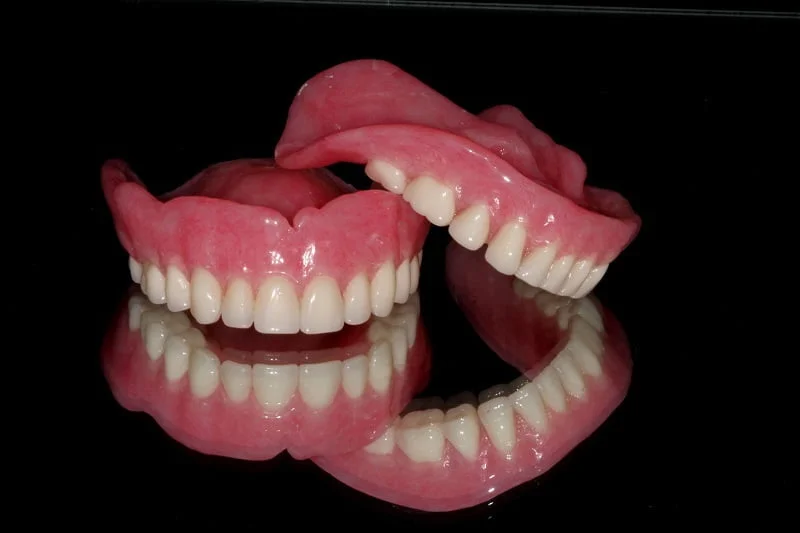
Complete Dentures
These custom made dentures are designed to replace all the teeth in either your upper or lower jaw or even both jaws depending on your needs. They are fabricated to closely resemble your natural teeth in size, shape, and color, offering a natural-looking restoration.
Complete dentures may include various features to improve retention and stability. These might include strategically placed contours that fit snugly against the gums or strategically placed internal undercuts. In some cases, denture adhesives can be used for additional security.
Advantage
- Restores full smile and chewing function.
- Relatively affordable compared to other options.
- Easy to remove for cleaning.
Disadvantage
- May slip or become loose, affecting speaking and eating.
- Can contribute to bone loss in the jaw over time.
- May require denture adhesives for better retention.
- Can slightly alter taste perception due to palate coverage.
Partial Dentures
Partial dentures are designed for individuals with some remaining natural teeth. They consist of a metal framework that clasps onto healthy teeth for support, holding replacement teeth in place for the missing gaps.
It offers a versatile and cost effective option for restoring your smile when you have some remaining natural teeth. These custom made dental appliances fill in the gaps left by missing teeth, preventing surrounding teeth from shifting and maintaining proper bite alignment.
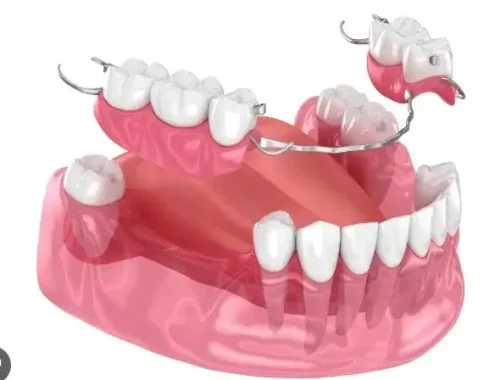
Advantages
- Preserve healthy natural teeth by filling gaps left by missing ones.
- Prevents remaining teeth from shifting out of place, maintaining proper bite alignment.
- More affordable than complete dentures.
- Generally Partial Dentures are comfortable and less bulky than complete dentures.
Disadvantage
- Metal clasps holding the denture in place might be visible and aesthetically unpleasing for some.
- Requires cleaning of both the denture and natural teeth for proper hygiene.
- May require adjustments or replacement over time as natural teeth change.
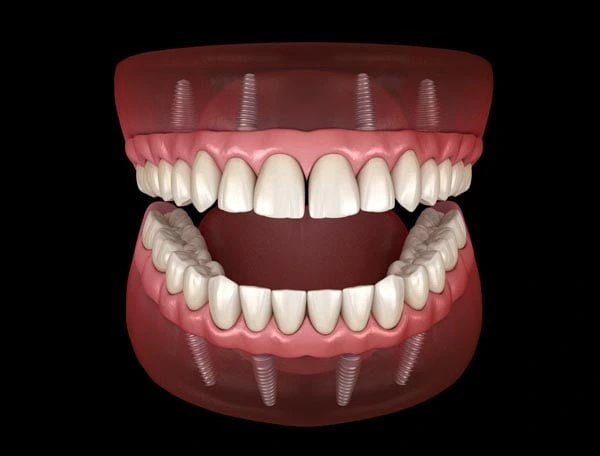
Implant-Supported Dentures
These dentures offer the most secure and permanent solution. They utilize dental implants surgically placed in the jawbone to anchor the denture. The denture itself can be fixed (permanent) or removable (detachable).
Implant-supported dentures are the most modern and secure option for replacing missing teeth. It doesn’t like a traditional dentures that rest on the gums, these dentures utilize dental implants for a permanent and stable foundation. This method works like natural teeth, giving a better fit and making eating and speaking easier.
Advantage
- Offers the most secure fit due to attachment to dental implants.
- Prevent bone loss by stimulating the jawbone with implants.
- Improved chewing comfort and function compared to traditional dentures.
- Increase confidence due to a more natural feel and reduced risk of slipping.
Disadvantage
- The most expensive option due to the surgical placement of dental implants.
- Requires a minor surgical procedure for implant placement.
- Healing time is needed after implant surgery.
Choosing the Best Denture Option
- Number of Missing Teeth: Complete dentures for all missing teeth, partial dentures for some remaining teeth.
- Jawbone Health: Implant-supported dentures may require sufficient bone density for implant placement.
- Budget: Traditional dentures are more affordable than implant-supported options.
- Desired Stability and Comfort: Implant-supported dentures offer the most secure and comfortable fit.
- Your Preferences: Discuss aesthetic concerns and lifestyle factors with your dentist.
- Material: Dentures can be made from various materials, with acrylic being the most common and cost effective. Metal frameworks in partial dentures can be made with different alloys for strength and aesthetics.
- Care and Maintenance: All types of dentures require proper cleaning and care to maintain good oral hygiene and prevent denture decay.
- Regular Dental Checkups: Regular visits to your dentist are essential for monitoring your dentures’ fit and overall oral health.
Improve Your Smile with Custom Denture Solutions
Missing teeth or poorly fitting dentures can affect your oral health, causing discomfort and making it difficult to enjoy food. To address these issues, we offer the best personalized denture services that will improve your oral health and restore your natural smile.
Consult Your Dentist:
A dental consultation is necessary for evaluating your specific needs and recommending the most suitable type of denture. Your dentist can explain all options, including materials, costs, and the treatment process, so you can choose the best option for a healthy and confident smile.
FAQs
Complete dentures replace all missing teeth, while partial dentures are used when some natural teeth remain, filling gaps and prevents shifting of other teeth.
Implant supported dentures are securely fixed to dental implants placed in the jawbone, offering a secure fit, better chewing comfort, and reduced slipping compared to traditional dentures.
Getting used to dentures may take a few weeks, as your mouth adjusts to speaking, chewing, and the fit. Regular adjustments can improve comfort.
Yes, dentures restore chewing ability, though certain foods might require adjustments. Implant-supported dentures offers a more secure option for improves eating comfort.
Dentures should be cleaned daily with denture cleansers and brushed to prevent plaque buildup. Regular dental checkups ensure fit and hygiene.
Hear From Our Patients
WHAT OUR PATIENTS SAY ABOUT US
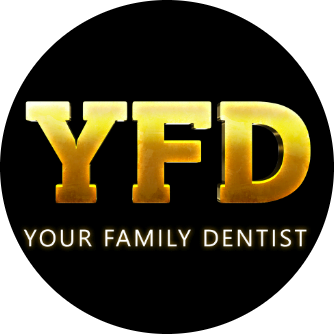
Deprecated: strlen(): Passing null to parameter #1 ($string) of type string is deprecated in /home/u337202703/domains/yourfamilydentistliverpool.com.au/public_html/wp-content/plugins/widget-google-reviews/includes/class-view.php on line 453
Thank you
Troy March
I brought my dad in at first because he was in pain, only to find out that he needed some serious work done. We were basically hand held and guided through the entire process with no details missed. The ladies at reception helped us with payment options. They worked with our hectic schedules, had a comforting setting ready at every visit and were just awesome altogether.
We are now repeating the same process but for my mum. I will recommend this dental practice to anyone that will listen. The owners are very involved and really care about safety and quality.
Thanks again team - you are truly appreciated 🙂
Highly Recommended Dentist. Infact my family members are very happy with their treatments too.
I appreciated the warmth of staff and their professionalism. They treat you with respect, calm, and they actually listens to what you're saying and give advice you want to hear regards to your treatments. I pay my treatments as I go as I refuse to go on plan and they respected that.
My over revelations looking at My Family Dentist is they are a blessings by employing lots of highly valued skilled staff, and they created miracles to every patients that uses their services. What they did to my teeth should last me for decades to come 100%.
A happy patient here , Thanks your family dentist.
And the costs involved.
Was affordable.
Thank you Dr Shaveta and Dr Nick .
Deprecated: strlen(): Passing null to parameter #1 ($string) of type string is deprecated in /home/u337202703/domains/yourfamilydentistliverpool.com.au/public_html/wp-content/plugins/widget-google-reviews/includes/class-view.php on line 453
Deprecated: strlen(): Passing null to parameter #1 ($string) of type string is deprecated in /home/u337202703/domains/yourfamilydentistliverpool.com.au/public_html/wp-content/plugins/widget-google-reviews/includes/class-view.php on line 453
Deprecated: strlen(): Passing null to parameter #1 ($string) of type string is deprecated in /home/u337202703/domains/yourfamilydentistliverpool.com.au/public_html/wp-content/plugins/widget-google-reviews/includes/class-view.php on line 453
Deprecated: strlen(): Passing null to parameter #1 ($string) of type string is deprecated in /home/u337202703/domains/yourfamilydentistliverpool.com.au/public_html/wp-content/plugins/widget-google-reviews/includes/class-view.php on line 453
Deprecated: strlen(): Passing null to parameter #1 ($string) of type string is deprecated in /home/u337202703/domains/yourfamilydentistliverpool.com.au/public_html/wp-content/plugins/widget-google-reviews/includes/class-view.php on line 453
Deprecated: strlen(): Passing null to parameter #1 ($string) of type string is deprecated in /home/u337202703/domains/yourfamilydentistliverpool.com.au/public_html/wp-content/plugins/widget-google-reviews/includes/class-view.php on line 453
Deprecated: strlen(): Passing null to parameter #1 ($string) of type string is deprecated in /home/u337202703/domains/yourfamilydentistliverpool.com.au/public_html/wp-content/plugins/widget-google-reviews/includes/class-view.php on line 453
Deprecated: strlen(): Passing null to parameter #1 ($string) of type string is deprecated in /home/u337202703/domains/yourfamilydentistliverpool.com.au/public_html/wp-content/plugins/widget-google-reviews/includes/class-view.php on line 453
This dental office is owned by the Bhayani, Dr Nick and Dr Shaveta and they have a bunch of excellent staff. You feel at home as soon as you enter and they do their work with love. I have been with them from 2020 and I am still with them.
Dr Nick Bhayani is a class of his own.
I love my teeth, thank you, Dr. Shaveta x
Highly recommend 👌
Location & Opening Hours
Liverpool
BlackTown
Car Parking Available
Conveniently located near our dental clinic are three available parking spots.
1] Free parking available at Westfields Liverpool.
2] Council car park directly across the street.
3] Private parking accessible through Bathurst St at 67 Elizabeth Drive for patient convenience.
These parking spaces are thoughtfully provided to make your visit as hassle-free as possible.
Quick Links
Contact Us
- (02) 9601 7534
- info@yfdl.com.au
- Liverpool
- Blacktown
© 2025 Your Family Dentist Mumbai. All rights reserved.
